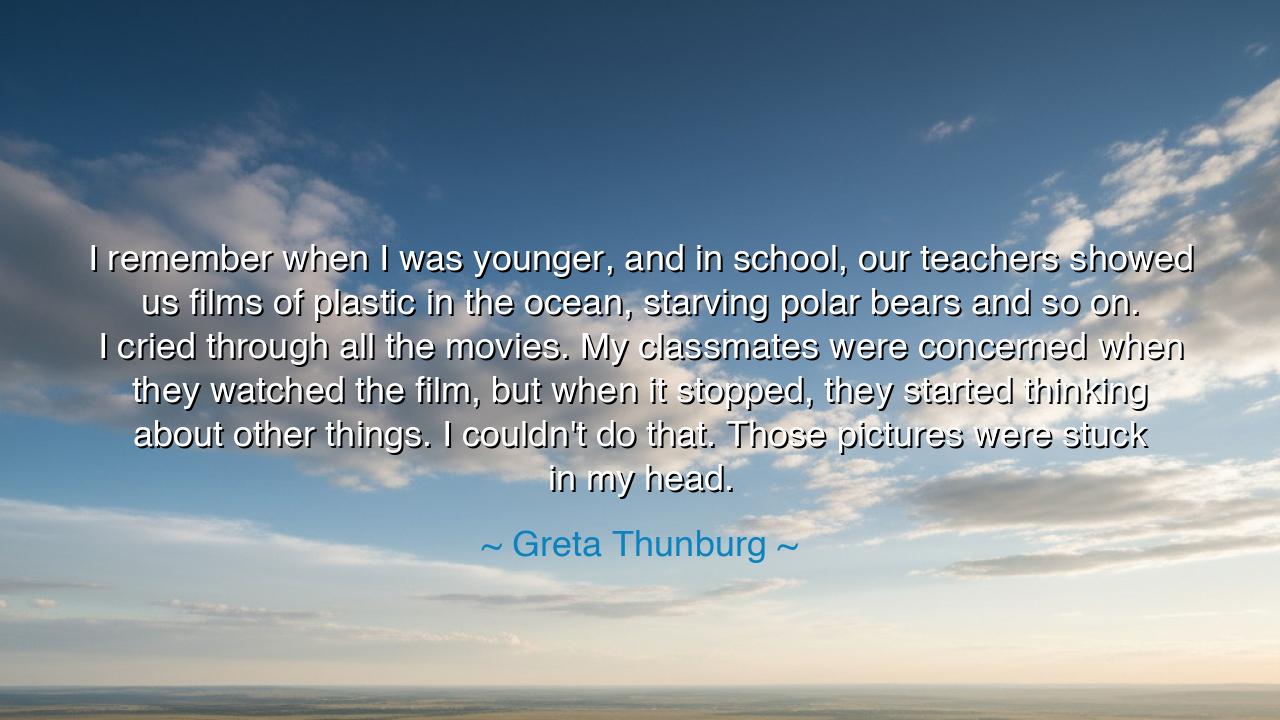
I remember when I was younger, and in school, our teachers
I remember when I was younger, and in school, our teachers showed us films of plastic in the ocean, starving polar bears and so on. I cried through all the movies. My classmates were concerned when they watched the film, but when it stopped, they started thinking about other things. I couldn't do that. Those pictures were stuck in my head.






Hear now the words of Greta Thunberg, a voice that echoes with the urgency of compassion and responsibility: “I remember when I was younger, and in school, our teachers showed us films of plastic in the ocean, starving polar bears and so on. I cried through all the movies. My classmates were concerned when they watched the film, but when it stopped, they started thinking about other things. I couldn’t do that. Those pictures were stuck in my head.” In these words, Thunberg speaks of a truth that resonates through the ages: the power of compassion and empathy can bind the heart to the suffering of the world, often leaving the individual unable to turn away from the reality of that pain, even as others are quick to forget.
In the ancient world, there were those like Socrates who challenged the very foundations of society, urging people to think deeply about the world around them. Socrates did not merely accept the surface of things, but dug into the truth beneath, questioning everything and holding a mirror to society’s injustices. Thunberg’s words, though rooted in a modern world, carry the same weight—an insistence on seeing the truth, no matter how painful it may be, and on carrying that truth with us, even when others turn their gaze away. Just as Socrates could not rest with superficial answers, Thunberg cannot turn away from the suffering of the world, even when those around her choose to forget.
Think, O wise ones, of Hercules, who, in his twelve labors, was not only tasked with performing feats of strength but with confronting the deep, difficult realities of the world. His labors were not mere actions—they were about facing overwhelming odds, confronting monsters and evils that threatened the world, and in many ways, about facing injustice head-on. Thunberg’s commitment to the suffering she witnessed, her inability to shake the images of those in pain, mirrors this ancient struggle. It is the struggle of one who refuses to turn away, who accepts the heavy burden of truth and empathy, knowing that only by carrying the weight of the world’s suffering can we begin to change it.
In the same vein, think of Mother Teresa, who, despite the overwhelming suffering she witnessed in her work with the poor and dying in Calcutta, never allowed herself to become numb to it. She did not let the suffering around her fade from her thoughts, but instead, she responded with love, dedicating her life to alleviating that suffering. Thunberg’s words echo this deep compassion, the unwillingness to let the pain of the world be forgotten or ignored. To see such suffering and to not turn away—this is the call of the truly compassionate soul.
There is a lesson in Thunberg’s words, O seekers, one that speaks to the very heart of what it means to be human. To truly feel the world’s suffering is not to be overwhelmed by it, but to be motivated by it. Thunberg is not speaking of helplessness, but of the call to action that comes when we refuse to ignore the world’s pain. When we truly see the suffering around us, whether it be the plight of polar bears or the destruction of nature, we are called to act. Her words are a challenge to all of us: how can we remain indifferent when the truth is so clear, so pressing? The images that remain in her mind are not burdens—they are beacons, guiding her toward the actions that will help heal the world.
Think, O future generations, of the impact of awareness. While others may choose to forget, those who carry the images of the world’s suffering are the ones who can spark change. Like the ancient prophets, who spoke truths that were uncomfortable, even unwelcome, Thunberg’s words urge us to carry the truth of our world’s pain in our hearts, not as a weight, but as a call to action. To feel deeply is to be alive to the world, to be open to its struggles and its triumphs. The lesson is not that we should become overwhelmed by guilt, but that we should channel our empathy into purposeful action, knowing that even the smallest efforts can begin to shift the balance.
Therefore, O seekers of wisdom, let Thunberg’s words serve as both a call and a guide. Do not turn away from the world’s pain. Let the suffering of others—the plastic in the ocean, the starving animals, and the dying ecosystems—become not just images in your mind, but the force that drives you to make the world a better place. Take action—however small, however grand—and know that by embracing the pain of the world, you can help create the change it so desperately needs. Compassion is not just a feeling; it is the action that follows it, the courage to move forward despite the pain, and the unwavering belief that, through our collective effort, we can build a better, more just world for all.






AAdministratorAdministrator
Welcome, honored guests. Please leave a comment, we will respond soon